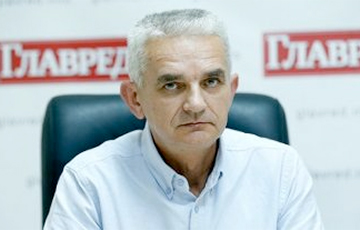Oleksiy Melnyk: AFU's Approaching Favorable Moment
1- 17.11.2022, 15:05
- 18,826

PHOTO: GLAVRED
There are key reasons that prevent the Russian army from adapting to war.
After the successful offensive of the Armed Forces of Ukraine in the south and the capture of Kherson, the question arises: will Ukraine be able to continue the liberation of the occupied territories or will the war move into a more positional phase?
The Charter97.org website spoke on this topic with the Co-Director of Foreign Relations and International Security Programmes at the Razumkov Centre, the first assistant to the Minister of Defence of Ukraine (2005-2008), military expert Oleksiy Melnyk.
— Let's start with the Ukrainian successful offensive in the south. How did they manage to do it?
— Effective preparation was the key to the success of the Kherson Operation and its realization (there was no need to storm such a large city).
First of all, this is the destruction of supply lines, logistics, that is, the creation of conditions under which the enemy is not able to hold a bridgehead. Also, active hostilities did not stop, and not just artillery strikes on the main lines of communication and command posts.
Active counterattacks in various sectors continued at the same time. All this together led to the fact that the Russian command came up with such decisions.
— Does the Russian military command learn from its mistakes?
— There is a classic expression that "Generals are always refighting the last war". Probably, Ukrainian tactics also contained some tricks taken somewhere from classic lessons, but at the same time, a lot of adjustments were made from the experience of conducting Joint Forces operations in Donbas. Especially valuable are the changes associated with the very fresh experience that Ukraine has received since February this year.
We should not also exclude that all this time (not only the last eight years, but even more) Ukraine has been actively cooperating with NATO, both with the organization and with NATO countries. Four training missions worked in Ukraine. They have been conducting individual training for soldiers and for units. Also, there was a group of strategic-level advisers. This combination of factors has also allowed Ukraine to use more advanced tactics than what we have seen in Russia.
Returning to the question of whether the Russian side is learning from its mistakes, according to the opinions of our military, they are also able to analyze their own mistakes, in some situations the Russians adopt the Ukrainian experience. But there are key reasons that do not allow Russia to adapt to the current situation as quickly as Ukraine. Firstly, this is a very centralized system of governance, that is, the lack of initiative of the lower ranks and the lack of the right to implement this initiative. This situation is familiar to the Ukrainian military from the first years of the Donbas operations when permission to open fire at the battalion level came or was requested from the central command. So far, Russia has largely retained this very strict vertical and the lack of delegation of authority to the lower ranks.
— It is believed that hostilities will decrease in winter. Is this a correct opinion or not?
— There are obvious arguments that winter creates additional difficulties not only for military operations but for any activity. Starting with the fact that the soldiers in open positions are to keep warm and maintain their health. It's very easy to catch a cold. This applies to everyone, and especially those who are, let's say, in uncomfortable conditions.
Again, there are limitations in terms of equipment, whether it can be used as efficiently as in summer or not.
There is a certain range of weather restrictions when low temperatures and snow cover create additional unmasking factors. If there are a lot of such moments, they allow us to conclude that the intensity of hostilities may decrease.
How will it really be? I think we need to wait and see, because, with all these limiting factors, there is a question of maintaining the initiative on the battlefield. The Ukrainian forces are approaching a favorable moment. You can't stop the offensive, because then you allow the enemy to regroup, gain additional reserves and equip defence lines. These factors have the opposite influence on decision-making. But the situation will show what will happen.
— What axis can now become a priority for the Armed Forces of Ukraine?
— It is difficult to determine or predict the exact location of the next strike. And this also characterizes the successful tactics used by the command of Ukraine.
At the same time, offensive actions are being prepared in several axes. They will conduct the next breakthrough depending on the most favourable conditions. This does not mean that other positions will be somehow exposed or that the Armed Forces of Ukraine will concentrate only on one axis. The enemy also monitors all this, if the plan is revealed in a timely manner, then the probability of success of such an operation is significantly reduced.
— Is there any possible victory of the Armed Forces of Ukraine that can force Putin to leave Ukraine: captured Melitopol, Donetsk, liberated Crimea?
— In my opinion, it would be wrong to talk about some settlement or section of the front that can completely change the situation.
It can be assumed that some regular breakthroughs or blocking of the exit of the Russian group of troops in Melitopol or Mariupol can provoke some kind of action, and it will be possible to say that the course of the war has already completely changed. However, the Ukrainian army is only moving in this direction so far.











